Passionflower is a broad category of flowering plants that are used in herbal supplements to aid in relaxation and reductions in stress and anxiety and as a sleep aid by people with insomnia.
The long history of passionflower in herbal medicine is now being matched with modern scientific research into its specific beneficial health effects on relaxation, stress levels, and feelings of anxiety.
Our researchers have ranked and reviewed the ten best passionflower supplements on the market, plus put together a detailed guide to the benefits and side effects of passionflower supplements. Read on for more.
Research
Rankings
1. Nature’s Answer Passion Flower Capsules
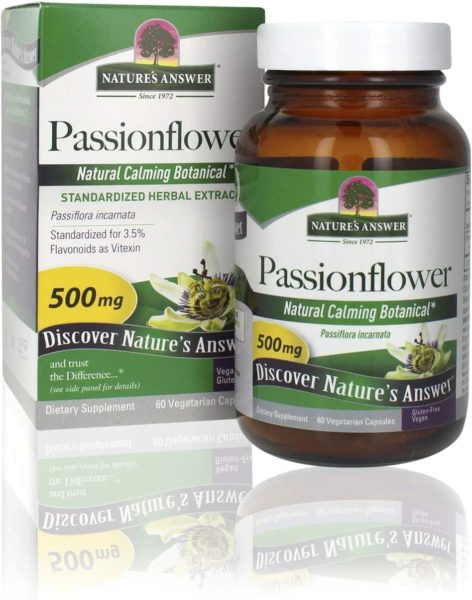
Nature’s Answer Passionflower contains 250 mg of passion flower extract, standardized to 3.5% flavonoids. Aside from a few binders to keep the capsules together, it has no other ingredients, making it a very solid choice for an all-purpose capsule-based supplement.
Thanks to its great supplement design and purity, it’s our number one pick.
2. Herb Pharm Passionflower
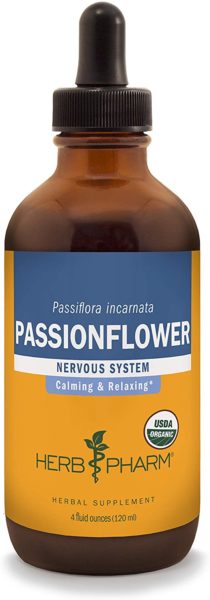
Herb Pharm Passionflower uses a cane alcohol elixir base to deliver a concentrated dose of the biologically active compounds in passionflower. The large volume makes it great even for heavy users, and the tinted amber glass protects the delicate compounds from being oxidized by light.
3. Nature’s Answer Passion Flower
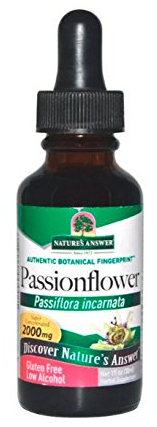
Nature’s Answer Passion Flower comes in a tincture of alcohol and water. This liquid passionflower supplement delivers 550 mg of plant extract per serving.
For a liquid supplement, the design is surprisingly clean: it only uses water, alcohol, and glycerine to keep the passionflower extract dissolved in the solution.
As with all liquid supplements, the convenience of a liquid format is counterbalanced by the difficulty of measuring out precise dosages.
In this case, you’ll have to count out 56 individual drops to get the appropriate serving size of two milliliters. At this dosage, the actual alcohol content is exceptionally low, so even people who are very alcohol-sensitive shouldn’t have any issues.
4. Solaray Passionflower
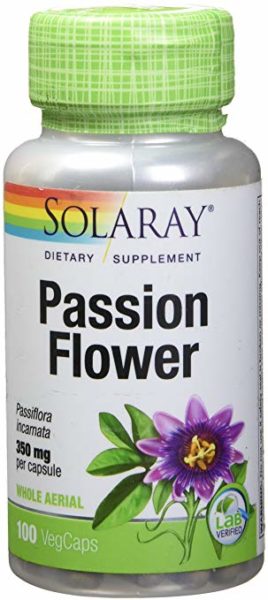
Solaray Passionflower has a solid middle-of-the-road dosage of 350 mg of plant material per capsule. The capsules themselves are made from cellulose, and there are no binders or fillers, making it a simple and straightforward option for a capsule-based passion flower supplement.
5. Secrets of the Tribe Passionflower
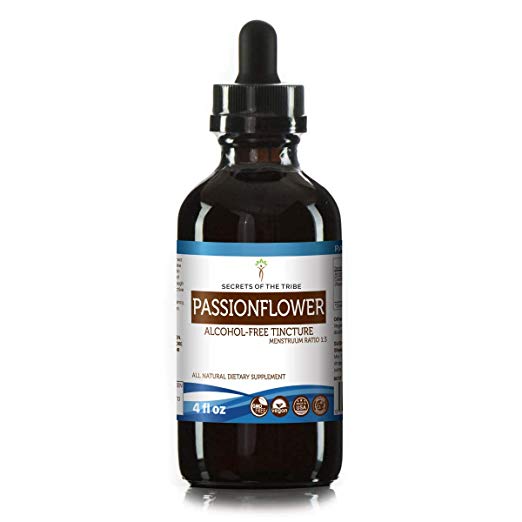
Secrets of the Tribe Passionflower is a liquid tincture of passion flower that’s distinguished by the fact that it’s completely alcohol-free.
It uses only water and vegetable glycerin to extract the biologically active compounds in passion flower. If you are on a strict no-alcohol regimen, it’s a good choice.
Moreover, the bottle is quite large, at four fluid ounces, meaning that this liquid passion flower supplement will last you quite a while.
6. Micro Ingredients Organic Passion Flower Extract
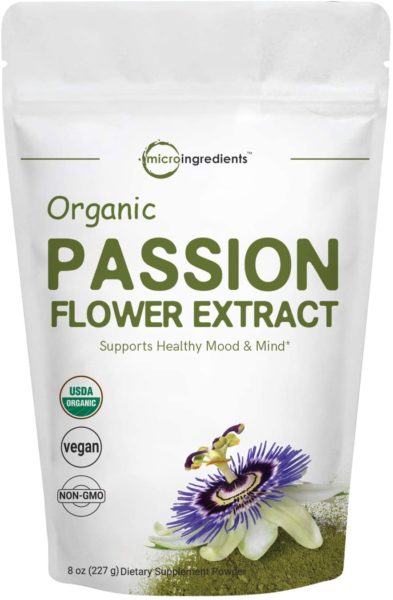
This certified organic passion flower supplement is finely-powdered, making it the perfect for blending into shakes, smoothies, or meal replacement shakes. The only downsides are that powders can be a bit messy compared to liquids and capsules, and that the powder is too fine for using in passion flower tea (use a raw loose leaf passion flower supplement instead).
7. Starwest Botanicals Organic Passion Flower Leaf Powder
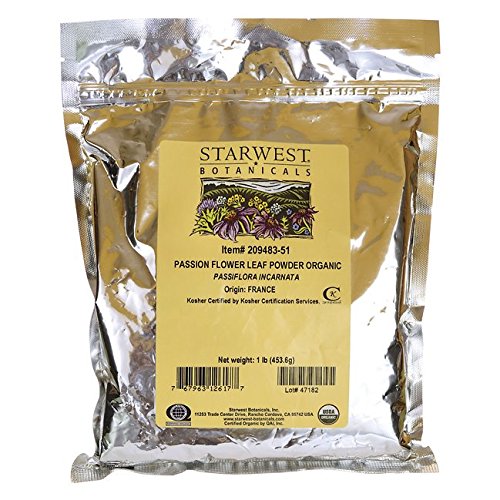
This one-pound resealable bag from Starwest Botanicals is the best bulk buy on the market, thanks to its organic certification.
However, the uses of bulk passion flower are limited beyond herbal tea, so it’s more of a specialized pick for that reason.
8. Horbaach Passion Flower Tincture
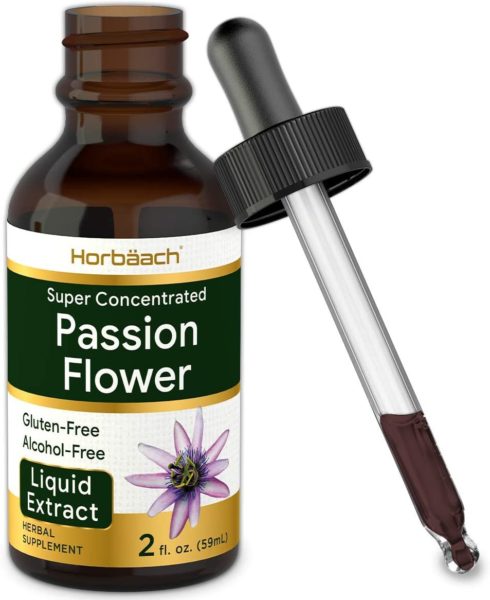
Horbaach makes a simple passion flower tincture that comes in a small two-ounce dropper bottle. While it doesn’t offer the same value as larger bottles of liquid form passion flower extract, it is a nice size for travel, or to stash in your desk at work for use on long, stressful days.
9. Bulksupplements Passion Flower Extract
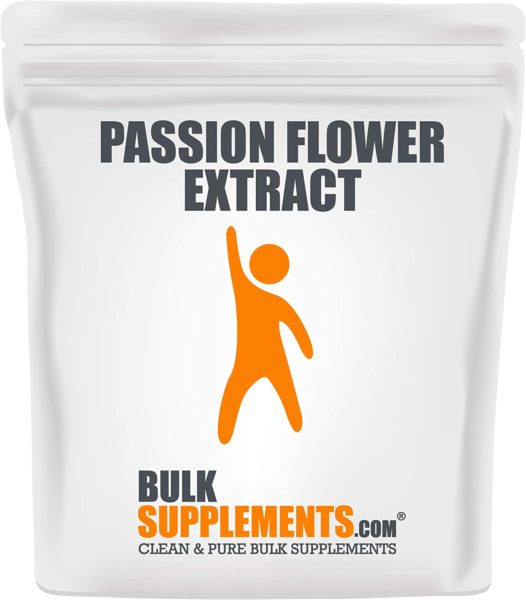
Bulksupplements delivers its trademark super-pure and simple powder-form supplements in its passion flower extract: this powderized extract comes in a 250 gram resealable plastic bag.
However, due to the fairly small doses most people use for passionflower, it’s not particularly useful unless you are mixing up large batches of herbal preparations.
Even then, you’ll need a precision scale to measure out anything resembling a consistent dosage, so despite its purity, Bulksupplements is only recommended for niche users.
10. Puritans Pride Passion Flower Extract
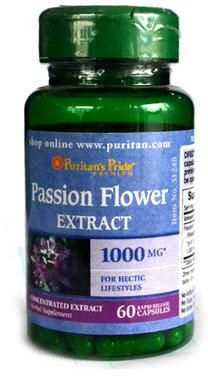
Puritans Pride Passion Flower claims to deliver 1000 mg of passion flower, but it’s really 250 mg of a 4x concentrated passion flower extract.
Because of this, it’s hard to compare the dosage of this supplement to its competitors that truly deliver raw plant material.
When it comes to the extracted compounds in passion flower, most people would be better suited going with a liquid form passion flower extract, because the same compounds are contained in a solution with more flexibility in dosage.
If you are looking for raw plant material, there are plenty of better options on the market as well.
Category winners
Best passion flower overall: Nature’s Answer Passion Flower Capsules
In a simple capsule-based design, Nature’s Answer provides a solid dosage of standardized passion flower extract with little in the way of extraneous ingredients. For general-purpose use, it can’t be beat.
Best passion flower for anxiety: Herb Pharm Passionflower
We recommend Herb Pharm Passionflower for anxiety thanks to its rapid absorption and easily-titrated dose. Whether you need just a drop, or a few more, it’s easy to measure out the right dose to calm your nerves.
Best passion flower for sleep: Herb Pharm Passionflower
To soothe your body and mind before going to bed, the rapidly-absorbed liquid formulation of Herb Pharm is perfectly-suited for the task. The liquid form also makes it easy to customize the dosage to fit your needs, helping to ensure you sleep through the night without feeling groggy the next day.
Best passion flower for tea: Starwest Botanicals Loose Leaf Passion Flower
Starwest Botanicals makes loose leaf passion flower that is cut perfectly for use in any standard tea strainer. For herbal tea before bed, or a warm beverage to calm your nerves, it’s our recommendation.
Best passion flower for a racing mind: Herb Pharm Passionflower
To calm down a racing mind, our favorite choice is Herb Pharm Passionflower, due to its rapid absorption (a consequence of its liquid elixir format). Faster absorption means faster relief, so it’s hard to go wrong with Herb Pharm for this application.
Best capsule-based passion flower extract: Nature’s Answer Passion Flower Capsules
For less mess, Nature’s Answer Passion Flower is our recommendation. If you don’t want to worry about measuring out a precise dose, this supplement delivers a highly reliable dose of passion flower extract, and while it’s not the highest-dose or most rapidly-absorbed way to take passionflower, it’s definitely versatile and easy to take.
Who Should Buy Passion Flower?
Passion flower is safe for adults of all ages and can be used by individuals who suffer from sleep disorders like insomnia.
Furthermore, passion flower helps to treat anxiety and can be used to help patients manage stressful situations. Passion flower is not suitable for children and pregnant women.
How We Ranked
Passion flower comes in a variety of forms, including tablets, capsules, powders, and liquid extracts. To keep quality high and going relatively accurate, we decided to omit, for the most part, any product that wasn’t either a liquid extract, like Secrets of The Tribe or capsule-like Vita Cost. We did include certain powders, because of the manufacturer, Bulk Supplements is extremely reputable and does a high amount of third-party lab testing to ensure purity.
We also decided only to include standardized whole plant extracts or capsules, like Oregon’s Wild Harvest containing no less than 0.8% flavonoids or isovitexin. With liquid extracts, we did allow a little bit of alcohol to be present in the tincture. However, we rated products that limited alcohol, like Nature’s Answer, higher.
Of all the forms of passion flower, powder ranked the lowest. This is because powders are not travel-friendly, doses are not set (so mistakes are more likely), and it doesn’t offer a great taste. Liquid extracts came in second because dosing can be off if it’s not mixed well. Capsules provided the most accuracy and reliability and were ranked accordingly. Certain capsules were ranked lower, like NOW because they included stabilizing agents like silica.
Passion flower benefits and side effects
Passion flower is a genre of flowering plants that are found throughout the Americas, and the material of this plant has long been suspected to have calming properties.
It’s become increasingly popular as a way to induce relaxation and keep feelings of stress and anxiety at bay thanks to endorsements by herbal medicine enthusiasts such as Dr. Oz.
Interestingly, passion flower also has an increasing body of scientific literature that supports its use as a treatment anxiety and stress. It compares well to alternative treatments for anxiety on a number of fronts.
Benefits
Passion flower has been shown to reduce anxiety. Anxiety is a common mental health problem, and many of the mainstream treatments consist of heavy-hitting pharmaceutical drugs.
As such, there’s a lot of enthusiasm both among patients with anxiety and the doctors who treat it to seek out treatments that are effective and lack the side effects of strong anti-anxiety medications.
One study that showed the impressive promise of passion flower was published by a team of doctors in the journal Anesthesia & Analgesia in 2008 (1). The study consisted of giving either a 500 mg passion flower supplement or a placebo supplement to a group of 60 patients prior to undergoing surgery.
As you might expect, preparing for and undergoing surgery induces quite a lot of anxiety, so this experimental design is a clever way to reliably induce feelings of anxiety in both the experiential and the control group.
The results showed that the passion flower supplement induced a significant and measurable reduction in symptoms of anxiety compared to the placebo.
Interestingly, though many people also use passion flower as a sedative or sleep aid, the researchers did not find that the passion flower supplement caused a deterioration in motor control skills, which is what you’d expect if the passion flower supplement was acting as a strong sedative.
Passion flower has sedative effects that might help with falling asleep and with treating insomnia. Beyond relieving stress and anxiety, passion flower also appears to have a sedative effect, which has lead many people to use it as a sleep aid.
As early as 1946, passion flower was recognized for its sedative effects in the scientific literature (2). According to a 2005 review article published in the Journal of Psychopharmacology, passion flower has been found to have a reliable sedative effect in animals (3).
However, there have not been controlled experiments in humans to investigate the sedative benefits of passion flower yet—it’s not as well-researched as something like melatonin.
Still, many people report that passion flower supplements or passion flower tea are helpful for falling asleep and as a treatment for insomnia, and with some biological support from animal experiments, it could be worth a try for its potential sedative benefits.
Passion flower has a lower incidence of side effects compared to standard pharmaceutical treatments for anxiety. One randomized controlled trial published in 2002 in the Journal of Clinical Pharmacy and Therapeutics compared passion flower extract with oxazepam, a standard drug, in patients with generalized anxiety disorder (4).
Thirty-six people with generalized anxiety were randomly assigned to receive either the passion flower extract or the standard drug treatment, and were followed over the course of four weeks.
The results showed that the two treatments were equally effective, but the standard drug, oxazepam, alleviated symptoms more rapidly. However, the patients taking oxazepam also had a significantly higher incidence of impairments and disruptions in their ability to go to work and perform on the job compared to the people using passion flower.
In other words, while it took longer for the effects to kick in, passion flower extract was equally effective after one month, and had a lower risk of impairing job performance compared to a mainstream drug treatment.
These findings agree with the pre-surgical study examined earlier: since passion flower relieves anxiety without causing a deterioration in motor skills as you’d see with a strong sedative, it’s less likely to impair job performance and cause other negative adverse effects.
Side effects
According to the National Institute of Health, side effects that are associated with passion flower include dizziness, confusion, and muscle weakness—though some of these might be ascribed to the potential sedative capabilities of passion flower, and whether they are “side effects” or primary effects depends a bit on your perspective (5).
The NIH further notes that passion flower has widespread use both alone and in combination with other supplements, and has not been linked to any instances of liver damage.
Recommended dose
Research on appropriate doses of passion flower in humans is sparse, but evidence to date suggests that single doses of 500 to 750 mg of passion flower are likely effective.
The lower end of this range comes from research that has successfully used passion flower to treat anxiety, and the high end of this range comes from extrapolating doses in animal models (which are usually based on body mass) to the typical body mass of a human (6).
If you are using passion flower to treat anxiety, taking your passion flower supplement at the same time every day is probably the best dosing strategy. If you are using it as a sleep aid or treatment for insomnia, taking it before going to bed is going to be your best shot.
FAQ
What is passion flower good for? Passion flower is good for treating a variety of issues, including pain, menopausal symptoms, ADHD, anxiety, sleep proglems, heart rhythm problems, hemorrhoids, and skin burns.
Can I take passion flower and melatonin together? The short answer is yes, you can take passion flower and melatonin together. While no interactions have been found between passion flower and melatonin, it doesn’t mean no interactions exist.
Is passion flower a blood thinner? Yes, passion flower can contribute to blood thinning. Persons that are taking blood-thinning medications, such as anticoagulants, should not use passion flower.
Does passion fruit lower blood pressure? Passion flower may lower blood pressure, but more research is needed to confirm.
Is passion flower safe for pregnancy? Passion flower is not safe for pregnant women and should not be taken because passion flower may induce labor by stimulating the uterus. It may also interact with anesthesia and other medication that might be needed during pregnancy.
Will passion flower interact with any medication I might be taking? Yes, there are a few drugs that passion flower may interact with. Passion flower may not work well if you are taking sedatives because it has a very calming effect (7).
As such, you may not want to mix passion flower with phenytoin (Dilantin) or other anticonvulsants, barbiturates or any drugs for insomnia, like zolpidem (Ambien), ramelteon (Rozerem), eszopiclone (Lunesta), or zaleplon (Sonata). You should also avoid mixing them with any benzodiazepines like Xanax and Valium, and do not mix them with tricyclic antidepressants like nortriptyline, doxepin, amitriptyline, or amoxapine.
They also interact poorly with antiplatelet and anticoagulants that are blood thinners because they can increase the amount of time it takes your blood to form clots (8). This includes drugs like Plavix and Coumadin, as well as their generic forms.
You also need to be careful around monoamine oxidase inhibitors (MAOIs). These are older antidepressants that are rarely prescribed today, but a passion flower might increase their effects to a dangerous degree. Don’t mix them if you are still on Marplan, Nardil, or Parnate or their generic equivalents. Always consult your doctor before starting any supplement regimen.
How long should you take passion flower for? Passion flower capsules should contain no more than 400 milligrams of passion flower extract and is safe to take twice a day for a period of no more than 8 weeks. If you are taking the liquid extract, then it should only be used for 4 weeks. As with anything, taking too much of it will have adverse effects and is not recommended. This is not a nutritional supplement, either, so be careful with prolonged use as it is meant for a specific purpose.
How much passion flower should you take before surgery for anxiety? If you want to reduce your anxiety before surgeries, you can take 20 drops of a specific extract the evening before surgery and 90 minutes before surgery, provided that it is approved by your medical doctor and surgeon. Tablets that contain 500 milligrams may also be taken before the surgery with medical approval.
How does passion flower affect the brain? Passionflower is a very calming herb and can do wonders for anxiety and insomnia (9). Passion flower works by increasing the levels of gamma-aminobutyric acid (GABA) in your brain which then lowers the activity of your brain cells. This will allow you to feel more relaxed and slow your thoughts and racing mind, helping with anxiety and insomnia. Studies have shown that for many people, passion flower is as effective as oxazepam (Serax) for treating your symptoms. Others studies have shown that patients who took passion flower before surgery had less anxiety than those with the placebo but did not take a longer time recovering.
What is passion flower? The passion flower is a native plant for some parts of the Americas, but thanks to advances in botanical technology, the flower can now be grown throughout Europe as well. It has a sturdy stem made of wood, shoots that are herbaceous and can grow about 32 feet high. Each of these plants has flowers and the flowers have 5 white petals and 5 sepals each.
Is passion flower fruit edible? A few varieties of the passionflower fruit are edible, but many are not.
What are the side effects of taking passion flower? Side effects that are associated with passion flower include dizziness, confusion, and muscle weakness.
Which parts of the passion flower plant are used in medicine? The parts that are used in medicine are the pieces that are above ground. This includes the flowers, the stems, and the leaves.
How did passion flower get its name? The passion flower plant got its name because of the Passion, or the crucifixion of Jesus Christ. The flower contains 10 parts that seem like petals, which represent the disciples of Jesus but exclude Peter and Judas, as one denied him and the other betrayed. The flower has 5 stamens, which are said to represent the different wounds that were inflicted upon Jesus. The stigmas look like knobs, which represent the nails and the fringe represents the crown of thorns.
How do I supplement with passion flower? There are several different ways to supplement with passion flower. You can infuse it in waters and other liquids and drink it as an herbal tea or take it as a liquid extract. Passion flower supplements also come in tinctures, drops, and tablets and capsules. You should consult your doctor about the proper dosage and recommendations for your specific condition and needs. Although we have listed dosage information in our article, these are averages and recommendations that do not take your specific circumstances and medications into consideration.
Is passion flower safe for children? No, there have not been any studies performed on the effects of passionflower on children. As such, it’s recommended you do not give passionflower to your children without consulting a doctor first.
When was passion flower first used? Passion flower was first used by African American slaves who wanted to terminate their pregnancies. Passionflower itself will not terminate a pregnancy, but it was used as a sedative to prevent spasms and anxiety that occurred during the termination of pregnancies. Passionflower was used by a lot of Native American tribes in their traditional medicine where they created a poultice that contained passion flower to treat the inflammation that occurred with wounds and boils. Later, in the 19th century, Eclectic physicians used it as an antispasmodic medication that helped with female reproductive issues.
How did eclectics use passion flower? Eclectics used passion flower to treat a wide range of medical issues including muscle spasms, and respiratory problems such as the whooping cough, asthma, and croup. Epilepsy and digestive cramps were also aided by this flower. They also used it to help weak and disabled individuals with chronic fatigue and illness because of their restorative properties.
How has the use of passion flower evolved? Passion flower tends to play more of a calming and anti-anxiety role today. In 2005, a study actually showed passion flower as a promising alternative to drugs when it came to relieving symptoms of attention-deficit hyperactivity disorder (ADHD). Even in increased stress situations like panic, passion flower has been known to slow the breathing and allow the body to calm down and relax, decreasing the racing pulse and blood pressure and avoiding panic attacks.
Does passion flower have fewer side effects than drugs? Yes, passion flower has a lower incidence of side effects compared to standard pharmaceutical treatments for anxiety. In a 2002 study, research showed that when compared to Oxazepam, passion flower had significantly lower side effects, while still treating patients with generalized anxiety disorder. However, the passion flower did take a little bit longer to kick in, compared to the pharmaceutical drug.
Is passion flower used in addiction therapy? Yes, passion flower has been used in addiction therapy and can ease the withdrawal symptoms that arise when addicts are breaking the addiction to certain drugs. This works especially well with regard to opioid and benzodiazepine addictions. The passionflower can bind with these receptor sites, preventing the drug from binding there and allowing patients to rest and calm down without feeling the withdrawal pangs.
Can passion flower reduce anxiety? Yes, passion flower has been shown to reduce anxiety, especially in persons that have stressful situations common up. One 2008 study showed that 500mg of passion flower, given to patients prior to surgery, induced a significant and measurable reduction in symptoms of anxiety compared to the placebo (10).
Does passion flower help with sleep? Yes, passion flower has a sedative effect, which can help people with sleep issues like insomnia. However, there have not been controlled experiments in humans to investigate the sedative benefits of passion flower yet, only animals. Still, many people find that passion flower helps with sleep issues, especially insomnia.
What are the side effects of passion flower? According to the National Institute of Health, side effects that are associated with passion flower include dizziness, confusion, and muscle weakness. However, some believe that these are not side effects, just normal effects from the sedative and anti-anxiety effects of passion flower.
Does passion flower cause liver damage? No, there have been no links to passion flower causing liver damage.
How much passion flower should you take? There isn’t a ton of research, but evidence suggest that the optimal dosage of passion flower is 500-700mg.
When should you take a passion flower supplement? The best time to take your passion flower supplement depends on what you are treating. As a sleep aid or treatment for insomnia, taking it at a night, before going to bed is optimal. If you are using passion flower to treat anxiety, taking your passion flower supplement at the same time every day is ideal.
Is passion flower safe to take? In general, passion flower is safe to consume, as long as you are staying within the recommended doses. Special populations like pregnant women and children should not consume passion flower, due to the lack of research regarding the safety. Persons taking any medication should consult their doctor, before taking any passion flower supplements.
Related Articles
Recap
Passion flower is an herbal supplement that shows strong promise as a treatment for anxiety and additionally holds potential as a sedative and sleep aid for insomnia.
Doses of 500 to 750 mg seem to be effective at reducing anxiety, and while it may take up to four weeks for a passion flower supplement to have a significant effect on anxiety, passion flower has been shown to cause fewer side effects and less job impairment than standard treatments for anxiety.
Short-term studies have found that it can also have immediate effects on reducing acute anxiety, and animal research indicates that the sedative effects of passion flower could help with falling and staying asleep.
Passion flower is well-tolerated, and the only side effects associated with it are dizziness, confusion, and muscle weakness. Passion flower is one of the best herbal solutions for anxiety, and it has a lot of promise as a sleep aid as well.
For Body Nutrition’s #1 passion flower recommendation, click here.